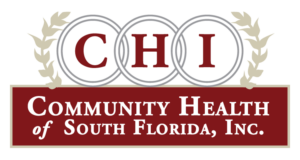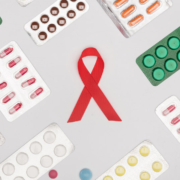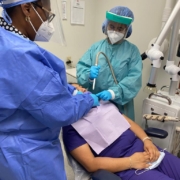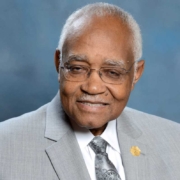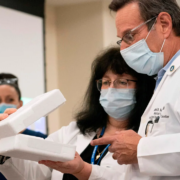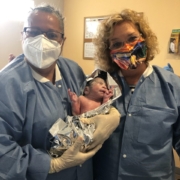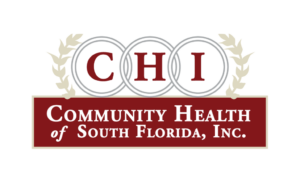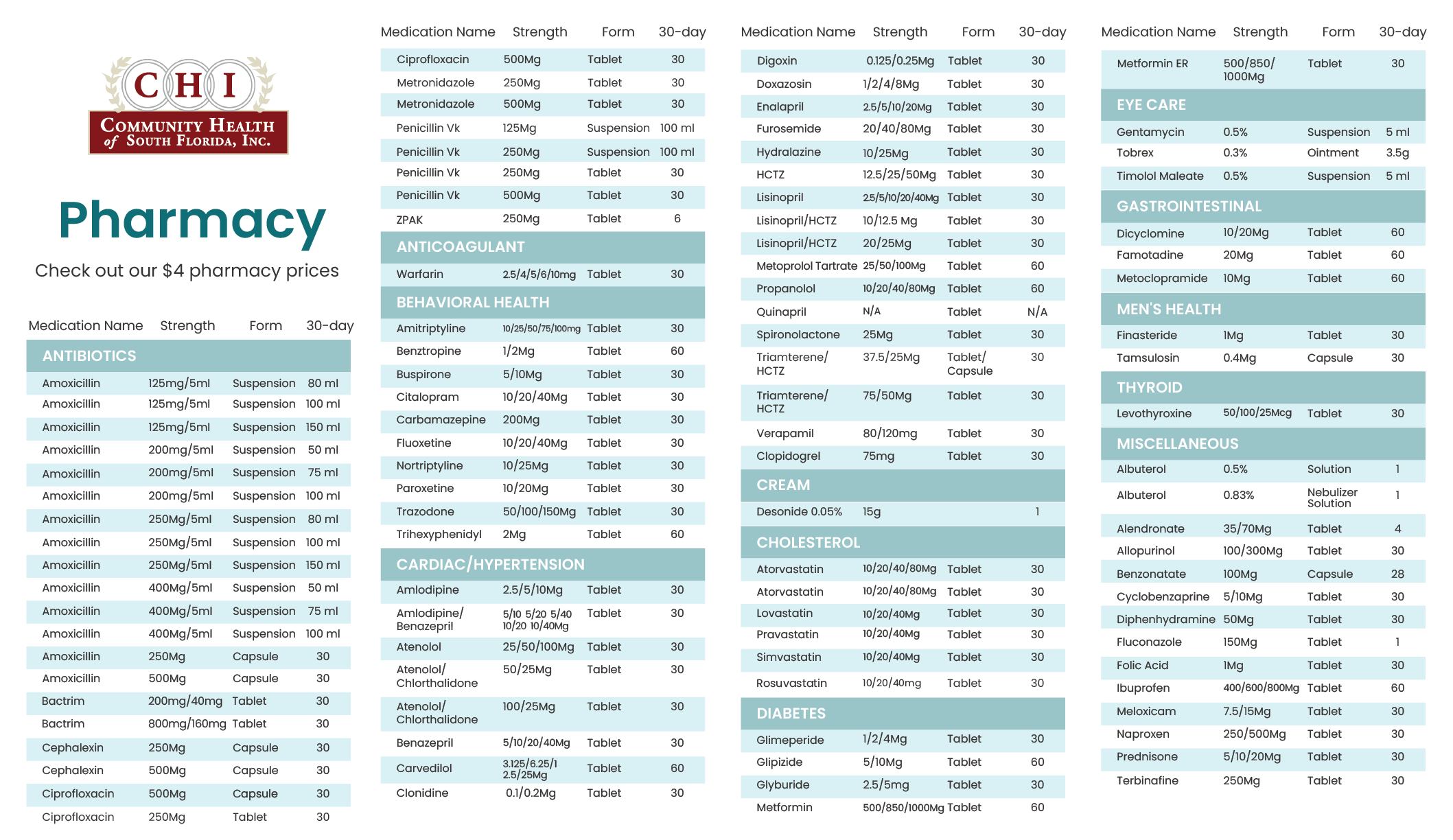NBC: Professionals Say 2020 Will Have Long-Term Impacts on Mental Health [Twitter]
/in NewsIn a year that was filled with uncertainty, isolation and grief, @SimoneBoyce reports on what mental health professionals have struggled with in 2020 and what makes them stay hopeful.
Watch NOW: https://t.co/U4UZMHn7bF pic.twitter.com/zSgaNG4psE
— NBC News NOW (@NBCNewsNow) December 15, 2020
What We Know and Still Don’t Know About COVID-19
/in News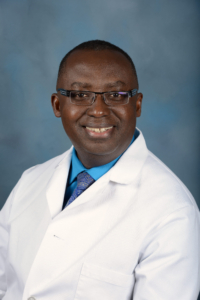
Dr. Saint Anthony Amofah, Senior VP, Chief Medical Officer and Chief Academic Officer for CHI has been an integral leader of the CHI COVID-19 Response Team
A year into the world’s COVID-19 pandemic and much is still unknown about the illness. But every day, Community Health of South Florida, Inc. (CHI) learns new insights and developments for the South Florida community.
Dr. Saint Anthony Amofah, Senior VP, Chief Medical Officer for CHI, and Chief Academic Officer, gives us some answers to the most common questions:
What can you tell us about convalescent plasma for COVID-19?
Some studies are beginning to show that when a patient recovers from COVID-19, they develop antibodies. Those antibodies appear to be helpful in controlling the virus. If a patient currently has COVID-19, they might not yet have formed antibodies. This patient could receive the plasma as a possible treatment to attack the virus.
What can you do to help keep yourself and others healthy?
It’s important to use masks appropriately, which means covering both your nose and mouth. We should also take social distancing very seriously. If you need to take your mask off, you need to be least 6 feet away from anyone. I think that is the biggest problem that people have is not staying away from folks when they have their masks off. Let’s say that you are talking to a person who is sick and does have their mask on. If you are less than 6 feet away, even with your mask on, they can still deposit the virus in your eyes. People should also keep in mind to wash their hands with soap as much as possible and at least use hand sanitizer every time you touch a surface.
Can you get the virus from touching surfaces?
Yes, you can. It is not high risk, but it has a significant risk. Somebody who is coughing, and sneezing can deposit droplets on the surface.
How long do droplets remain in the air? Can they be pushed through the air conditioning ducts?
That is something that we are still trying to figure out. Droplets are small drops of liquid that drop quickly. The other one we are also worried about are called droplet nuclei or aerosols. These are the ones that suspend in the air. However, the thinking is that even though they might be infected, they might not have enough virus to infect other people unless you are in a closed space with an infected person for a period of time. Air conditioning has not been shown consistently as a way to transmit the virus, except in high risk environments like hospitals. However, there is guidance on how to minimize the risk.
What about groceries, packages and take-out food?
The food within the container has a very small risk of being contaminated because it has been cooked at high temperatures. If you order takeout stick to things that they don’t touch when it is done cooking. The covering of the food is what you must be careful about the most, since it can potentially exchange hands. You should take all precautionary actions to disinfect it and remove the food from the container. If you go to the grocery store, the Centers for Disease Control and Prevention (CDC) says that you must not use disinfectants designed for hard surfaces, such as bleach or ammonia, on food packaged in cardboard or plastic wrap. Wash your vegetables and fruits with regular soap.
What do we know or suspect about the long-term impacts of COVID-19 on the body?
There is a lot of research being done at this point. CHI will be participating in research on this topic with Nova Southeastern University on looking at the long-term impacts. So far, we know that the virus can affect some organs of your body. First, it can affect the lungs as some people that have the virus might develop Pneumonia. Once COVID-19 is gone, some people have had issues with their hearts. COVID-19 can cause blood clots that can affect your heart and other organs like the kidneys and the brain. The truth is that it all really depends on how severe the virus was in your body. Not everyone will demonstrate long-term impacts.
Do pregnant women have a greater risk of getting sick from COVID-19?
The CDC has learned that pregnant women tend to have a more severe illness. They have a possibility of developing a high-risk pregnancy with preterm birth.
For more information on COVID-19 testing at CHI, please visit: https://chisouthfl.org/covid[/vc_column_text][vc_separator type=”transparent” up=”15px” down=”15px”][/vc_column][/vc_row]
CHI Dental Department Uses High Tech Innovations to Keep Patients Safe
/in News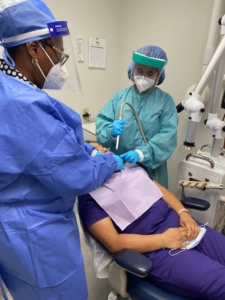
From left to right, Dr. Sheri Watson-Hamilton and Dental Assistant, Hilda Moreta, perform a routine care procedure using a rubber dam over the patient’s mouth.
Community Health of South Florida, Inc. (CHI) has gone above and beyond most dental practices and put in place high-tech innovative devices and strategies to combat COVID-19. These highly effective safety measures open the door for dental patients to safely return to dental care.
“Our first job is to be sure that our patients are safe,” said Dr. Sheri Watson-Hamilton, Director of Oral Health Services at CHI. “We are infection control experts and we are ready to provide a safe dental visit to all of our patients.”
Now, due to COVID-19, there are additional safety precautions in place, many of them recommended by the Centers for Disease Control and Prevention and the American Dental Association.
The dentists and hygienists wear personal protective equipment (PPE) that they change between patients. This is a ritual that requires them to take off booties, gowns, goggles, gloves and surgical masks and replace them with clean ones.
Once patients go into their appointments, they will be asked to wash their mouths with a
pre-procedural rinse before treatment to reduce any bacteria in the saliva.
“This is an extra 30-second procedure that will contribute to a productive, safe work environment,” said Dr. Watson-Hamilton.
In addition, dentists at CHI use rubber dams over a patient’s mouth for all procedures to limit the spray of germs from the mouth.
“This protective sheet has a hole that we position over a tooth and it allows us to isolate the treatment area,” explained Dr. Watson-Hamilton. “It helps us to stop oral bacteria from potentially contaminating the area.”
CHI’s Dental Services also utilize three high-volume suction procedures that create a dry and clean environment, improving the quality of its operatories.
“We are using what’s called an extraoral dental suction system,” said Dr. Watson-Hamilton. She explains it’s a machine used outside of the mouth. “We use it to effectively suction aerosols or germs in the air that might contaminate the dental room.”
CHI added another precaution that goes beyond what most other practices are doing and introduced “cold-fogging” in all CHI dental offices.
“Fogging is a technique we are using where we spray a safe-to-breathe disinfectant on all interior surfaces and providers in the cleaning process to ensure germs and viruses are eliminated,” said Dr. Watson-Hamilton. “We do this as soon as we are done with every appointment.”
Watch this video to see it on action
https://www.youtube.com/watch?v=y6S9HwP0gyE[/vc_column_text][vc_separator type=”transparent” up=”15px” down=”15px”][/vc_column][/vc_row]
Message from the CEO
/in News
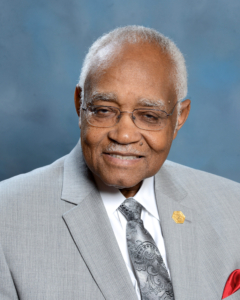
Brodes H. Hartley Jr. – CHI CEO
What a roller coaster of a year 2020 has been! We are all eager to get off this wild ride. COVID-19, the economy, race relations and politics have consumed us all. Our way of life has changed. But as I look back at the year that was, I see great resilience. I see innovation and I see strength.
The team at Community Health of South Florida, Inc. (CHI) has reinvented itself and the delivery of comprehensive healthcare to meet the needs of the community. CHI was the first to offer drive-through COVID-19 testing in Miami-Dade and Monroe Counties and continues to do so. The team worked tirelessly to implement SafeCare Procedures to ensure that our health centers were safe for our staff and patients. We put in place telehealth services to make sure that everyone still had access to care even if quarantined at home. We also unveiled our mobile medical van taking healthcare into some of the most hard-to-reach
communities.
But collectively all of you also showed your strength. Together, we broke ground for a new Children’s Crisis Center slated to open in 2021. That project continues to be supported through your donations. You also made signs, sent gifts,
and showed your support and gratitude for our healthcare workers. Your love and gratitude helped to keep our team going during some of the toughest times.
There are lessons learned. I see one of the greatest takeaways from 2020 was that together all things are possible. This holiday, I thank you all for the gift we’ve given each other. My hope is that we continue to be there for each other as we heal and head into the New Year. The year 2021 is a golden year of celebration! This fine organization turns 50 years old! We are hosting a year-long celebration of events under the theme “Legacy of Excellence in Caring.” I am so excited and proud to reach this milestone for CHI. I hope you all will participate and stay engaged in the coming year of celebrations.
With Gratitude,
Brodes H. Hartley, Jr.
Baby Delivered at CHI’s Marathon Health Center
/in News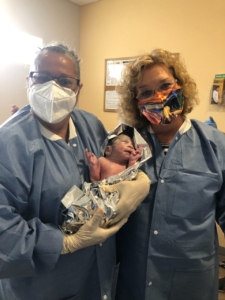
From left to right, Vilma del Valle, Medical Assistant and Dr. Sharon Ward are all smiles as they hold the baby born at the Marathon Health Center
Having a baby can be very exciting. But Ana Rivas has a story she will never forget. She welcomed her baby into the world on September 9th at Community Health of South Florida’s Marathon Health Center.
Rivas made her way toward the center for her weekly pregnancy exam with Dr. Sharon Ward, CHI OB/GYN Specialist. But she said she felt different that day.
When she arrived in the lobby, medical assistant, Vilma Del Valle, saw Rivas and asked her what was wrong. Rivas told Vilma she wasn’t feeling well and felt nauseous.
“I knew something was not okay,” said Del Valle. “I immediately went to check her vitals to see what was going on.”
When Del Valle took Rivas to the vitals room, she started moaning on the scale. Ana was experiencing pain every seven minutes.
“I quickly realized she was having contractions,” Del Valle said. “They came more frequently and ferociously every time.”
Del Valle quickly brought Dr. Ward to the exam room to check on Rivas.
“Mrs. Rivas was nine centimeters dilated,” recalled Dr. Ward. “We knew we had to keep an eye on her because she could deliver the baby at any time.”
Dr. Ward informed Del Valle that if her water broke, they would need to deliver the baby there.
Del Valle stepped out of the room for a minute and when she returned, she found water all over the place.
“Everything happened very quickly,” said Del Valle. “At that moment, I just screamed YES because I was very excited to see a baby being born at our center.”
Dr. Ward came back in the room along with other doctors in the center at the time: Dr. Cooreman, Primary Care doctor, and Dr. Morales, Pediatrician.
Staying calm, Rivas leaned back, kicked up her legs, and delivered the baby. She swaddled the crying child in a blanket and held him to her chest.
“It was a team effort,” said Dr. Ward. “It was all thanks to the people that were with us that made this delivery process so smooth and successful.”
In fact, Del Valle won CHI’s
ACTion Hero Award for her impeccable work in helping deliver the baby. Del Valle’s effort to put Rivas’ needs first built a trust and comfort for the laboring mother.
The little guy weighed 5 pounds and is 19 inches long. Rivas is thankful the CHI team was there to help.
“Thank God for the great team that received me and the baby and took really great care of us,” said Rivas.
A Trump Administration Policy Is Increasing Health Risks for Undocumented Pregnant Women Doctors Say
/0 Comments/in ArticlesMain Location
- 10300 SW 216th St.
- Miami, FL 33190
- (305) 253 - 5100
- Get Directions
